|
A Plague of Hunger America’s apple pie and waves of grain should nourish all, but plague and poverty leave bellies empty. Cars line up for bags of groceries handed safely through the window mask to mask. The virus may be on the wane, but folks still out of work still wonder where dinner will come from. Time was the kids got one good meal at school each day – before learning went online. Hunger lurks everywhere – country, suburb, city – here in our land of plenty, here where the rich get richer. The famished yearn for sustenance, for comfort and contentment. Why can’t their plates be full? 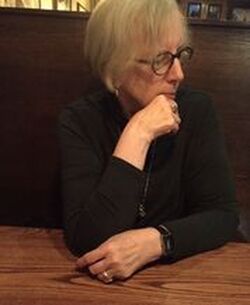 Sally Zakariya’s poetry has appeared in some 75 print and online journals and been nominated for the Pushcart Prize and Best of the Net. Her most recent publication is Muslim Wife (Blue Lyra Press, 2019). She is also the author of The Unknowable Mystery of Other People, Personal Astronomy, When You Escape, Insectomania, and Arithmetic and other verses, as well as the editor of a poetry anthology, Joys of the Table.
2 Comments
day laborers harvesting down the road today at the pecan orchard big shaking machines grab trees systematically sending tons of the delicacy down to sixty-cent an hour workers who gather the festively strewn bounty into gunny sacks headed for the privileged dining room tables on thanksgiving far from where they are or will be First published in: The Texas Review Sam Houston State University 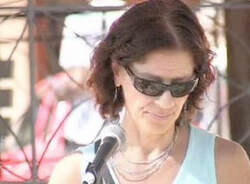 Janet Cannon’s poems have been published in many literary journals such as the William & Mary Review (College of William & Mary), and the Berkeley Poetry Review (University of California)—among others. She is the author of the poetry book/chapbooks: The Last Night in New York (Homeward Press), Percipience (Cross Cut Saw Press), and Day Laborers (Plan B Press). Janet has taught oral history writing workshops at the NYC Public Library (Chelsea Branch), and ESL at The New School in NYC and community colleges in New York and New Mexico—among other places. She is a graduate of the University of Iowa. Clean Your Plate I remember my mother saying, “Clean your plate, there are starving children who would love to be in your shoes.” I would sigh and eat my peas. Now an adult, her words echo in my head. To waste food seems an act of hate; so many crying for a meal. facing a true hunger, I have never had to feel. My oven warm from baking, even during summer, loves to feed people, The Italian heritage in my blood would like to feed the world. But I cannot set a table large enough to nourish all the starving. I cannot feed the world alone. This is a suffering we all own. Our future depends on building a human infrastructure, that cares about basic needs. Let us be hungry for change, until malnutrition is a problem of the past. Click to listen to the poet read the poem.  Brittany Sabatino is an Italian-American poet working in the Washington, DC area. She has also been published by Thirteen Myna Birds, Scarlet Leaf Review, Dyst Literary Journal and is a contributor in several poetry anthologies, including Spilled Ink, Train River Publishing, and In the Midst. Right now, she is working on refining spoken words skills and participating in virtual poetry open mics schedule permitting. A Brief History of Agriculture Once upon a time in the long ago plants and peoples two legged, four legged, six legged, eight legged, no legs, live in a harmony of prey and predator servicing each other for life and death. Then two legged peoples with busy mouths and grasping hands begin to settle, building cities, enslaving the land, the waters, the plants, and the peoples two legged, four legged, six legged, eight legged, no legs, breaking the harmony becoming predator to all. But now, some few two legged people seeing that the world is burning are planting trees and gardening for life inviting those others four legged, six legged, eight legged, no legs, restoring the harmony yard by acre rebuilding what was lost. Click to hear the poet read the poem. 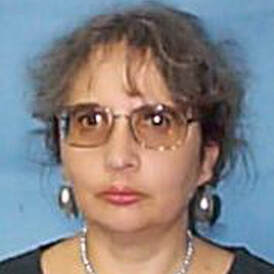 After spending 40+ years in corporate information technology, Marilyn Fishman retired to focus on the important things in life: gardening, reading, knitting, listening to classical music, and learning to write poetry. She is a Rutgers Certified Master Gardener Burlington County, NJ who gardens for life having created a National Wildlife Certified Habitat. Line Up Stand on one line to register to see the doctor. Sit and wait and wait and wait until doctor rushes in fast talk handing you a prescription. Stand on another line to pay for the visit. Walk over the cold bus line. Wait wait wait. Get on another line at pharmacy to pay for prescription. Stand on a very L O N G grocery store line to buy something to eat. Hurry quickly now to come home. You have followed the straight and narrow in this personal hell of lines. The bottom line is minus $100 and bread and jam for dinner. Questions Who took away spring stole all the glory throwing our gardens of green into these hills of scorched grass? Who dared to care more about money destroying everything good forgetting earth is our only home? Who is so callous to laugh at the suffering of the sick poor yet pretend to believe in a loving God? Who laughed at our hunger robbing our hope burning heaven with dry lightning to pierce the sky. Who began all these wars making mothers cry for children searching for their bodies in the chaos of destruction? Who are you who made the angels moan? 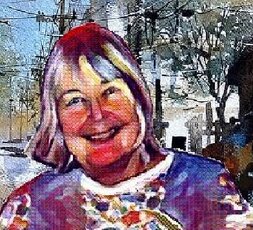 Joan McNerney’s poetry is found in many literary magazines and she has four Best of the Net nominations. Her latest titles are The Muse in Miniature and Love Poems for Michael both available on Amazon.com and Cyberwit.net. Lunch, circa forever Baloney. A slather of mustard scraped across white bread. An apple wrapped in a white napkin. A carton of milk. Then sleep, with the cookie clutched in my hand. Living Off the Fat of the Land Why do the bourgeoisie get headaches when they haven’t eaten for hours? Nothing will suffice except the cow ripped open, its lactose larder spilling over blueberries or firmed into cheese. One can never pile the raspberries high enough to stem the pangs of the hungry bourgeoisie. They cannot tussle, paddle, think, burn their way out of a paper bag until the stomach has been settled like an estate. 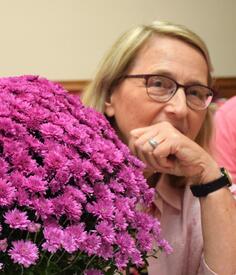 Rosemary Klein edited The Maryland Poetry Review throughout its 15-year existence, was founding editor and publisher of Three Conditions Press, has publications in regional, national, and international journals and anthologies, was a fellow at Virginia Center for the Creative Arts, a poet-in-residence at the George Washington Carver Center for Arts and Technology and for the Maryland State Arts Council, and a recipient of a Poetry for the People Baltimore Legacy Award. Going by the pond My father stops here on his way back home, still covered in the dry dirt of the field. This time last year the spillway ran half full, becoming home to frogs and water bugs, and minnows seeking safety from the bream. He looks down at the water line. It’s dropped another foot below the rim. The cattle finally choose to stumble in, their necks stretched to the dirt-brown water far below. He wondered if the geese would come this year, but they still found their way. A green heron the geese tried to chase away has settled at the far side of the pond. My father sits a while, watching the birds. When he stands, he reaches up to brush away the dust. Click to listen to the poet read the poem. 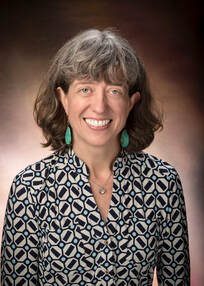 Wynne Morrison is a physician practicing pediatric critical care and palliative care at the Children’s Hospital of Philadelphia, where she holds the Justin Michael Ingerman Endowed Chair. She is a Professor at the Perelman School of Medicine at the University of Pennsylvania. Her published work focuses on ethics, end-of-life care, and poetry. Food In(secure) I know the rumble of a belly, It seems loud, but hunger is a silence. It hides in plain sight, descends on the food bank. Lines of mothers, fathers, grandfathers, children; heads down, bags hopeful. Rows of cans and boxes, sodium and fat content high. Vegetables and fruits coveted by all: a juice running down a child's chin, the wet smile of sweetness. Day-by-day worry gnaws at the food insecure Will there be enough? Can we get more? When will we be food secure? Food Bank Deposits Swim your fastest race, little one. It's worth three cans of spaghetti. Each glide, each stroke pulls in boxes of macaroni. Every 25 meters a flip turn for the rice. Forget the savory salt of popcorn as you dolphin kick. Longer strokes bring tuna can towers, omega-3 fatty acids. Peanut butter smooth freestyle slices of bread with jelly sweetness to quell the grumble. Swim meet deposits bridge a community. Bio: Serena Agusto-Cox was one of the first featured poets of the DiVerse Gaithersburg reading series in Maryland. Poems are in The Magnolia Review, MacQueen's Quinterly, Beltway Poetry Quarterly, Dissonance Magazine, Mothers Always Write, Bourgeon, and elsewhere. Work appears in the This Is What America Looks Like anthology, Mom Egg Review’s Pandemic Parenting issue, The Plague Papers digital anthology, H.L. Hix’s Made Priceless, Love_Is_Love: An Anthology for LGBTQIA+ Teens, and Midge Raymond’s Everyday Book Marketing.
Attachments area Tomatoes When everything has been taken and what remains behind are miles, paths of footprints in earth; when most everything known (other than what one carries inside a mind) is not here, when one, alone, surrounded by loss arrives at a camp, an expanse of tents and questions, data is taken, items are given: food, clothing, bedding, utensils, pots, jerrycans for water, cans of cooking oil; resilience and will transform emptied cans to planters: inside those tins, just outside a tent’s flap, soil becomes home for seeds. Tomatoes grow, stringy plants seem too frail to bear the weight of their fruit: tended, they survive, a line, a link, a memory, a smell, a taste, the familiar fact of picking and cutting and cooking. A trade; this tomato for that onion, becomes a market, vegetables lying on sand, on a cloth, their cost, a cause to speak; the words, the exchange, this is known. 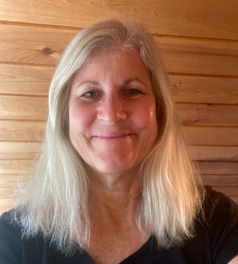 Lori Heninger is a writer, poet and nonprofit executive is Executive Director of The Montclair Fund for Women. Her over-30 years of experience in US- and internationally-based humanitarian and development work is the basis for much of her poetry. Lori received her PhD from City University Graduate Center in New York City, and currently lives in the rural eastern United States, with her husband, two dogs, a cat and six chickens. weeny (wiener) soup (a meditation on enrichment in impoverishment & systemic “food insecurity” in the Deep South, USA) Dolores, my sister, and me, one day got to talking about weeny soup on the phone her mouth watered about the same time as mine, “Keep this up, I‘ll go make me some,” she said, taking words & taste out of my mouth (both vegetarians by then) a few dyed dark-red weenies, canned tomatoes, water, salt & pepper, our food-magician momma cut up weenies in small chunks dumped in a big pot of water (onions if she had them) simmered slowly til the smell made you hungry; like the thought makes me, right now. No, i don’t reckon our Uncle Jack feels the same about salt & pepper sandwiches on white bread but he ate a sandwich like that, one time, with us, on Collins Street, did, and smacked his lips just like it was a git-down pig ear sandwich (with hotsauce & mayonnaise) but i still hate pinto beans. Not Cousin Jimmy. He loved ‘em then, he loves them now, and he will invite you to have some just as happy and proud - like, since he loves pinto beans, he knows you do. Not me. Just the words make my stomach cramp ever since that day after school, when i got home ahead of everybody & ate the whole pot. Yeah, i got sick. (Don’t get stupid on me.) You’d get sick too if you ate that many beans at once. Just the thought and i get sick, even now. (i’m getting sick now.) No. Naw. Give me weeny soup, any day and if i can’t get that, some pig feet will do. 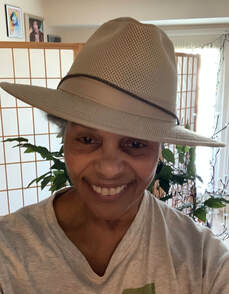 doris diosa davenport (pronouns: person/per) is a visionary 73 year old African American lesbian- feminist; independent scholar and literary & performance poet, born and raised in Cherokee Homelands (colonized by Europeans as Northeast GA). doris has published 12 books of poetry, most recently, dancing in time: poetry, monologue, stories, lies (2019). Per is the 2022 recipient of the Lillian E. Smith Writer-in-Residence Award (Piedmont University). |
AboutThe poems that follow are powerful evidence that Poetry Speaks Back to Hunger! Archives
October 2022
Poets
All
|
 RSS Feed
RSS Feed